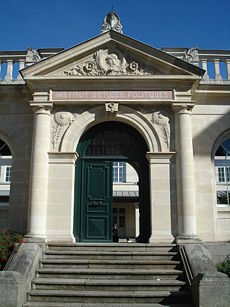
Institut d'études politiques de Rennes
Encyclopedia

Rennes
Rennes is a city in the east of Brittany in northwestern France. Rennes is the capital of the region of Brittany, as well as the Ille-et-Vilaine department.-History:...
. This prestigious and highly selective institute is modeled on the former Paris "École Libre des Sciences Politiques" (ELSP). Like the other Instituts d'Etudes Politiques in France (Aix-en-Provence
Aix-en-Provence
Aix , or Aix-en-Provence to distinguish it from other cities built over hot springs, is a city-commune in southern France, some north of Marseille. It is in the region of Provence-Alpes-Côte d'Azur, in the département of Bouches-du-Rhône, of which it is a subprefecture. The population of Aix is...
, Bordeaux
Bordeaux
Bordeaux is a port city on the Garonne River in the Gironde department in southwestern France.The Bordeaux-Arcachon-Libourne metropolitan area, has a population of 1,010,000 and constitutes the sixth-largest urban area in France. It is the capital of the Aquitaine region, as well as the prefecture...
, Grenoble
Grenoble
Grenoble is a city in southeastern France, at the foot of the French Alps where the river Drac joins the Isère. Located in the Rhône-Alpes region, Grenoble is the capital of the department of Isère...
, Lille
Lille
Lille is a city in northern France . It is the principal city of the Lille Métropole, the fourth-largest metropolitan area in the country behind those of Paris, Lyon and Marseille. Lille is situated on the Deûle River, near France's border with Belgium...
, Lyon
Lyon
Lyon , is a city in east-central France in the Rhône-Alpes region, situated between Paris and Marseille. Lyon is located at from Paris, from Marseille, from Geneva, from Turin, and from Barcelona. The residents of the city are called Lyonnais....
, Paris, Strasbourg
Strasbourg
Strasbourg is the capital and principal city of the Alsace region in eastern France and is the official seat of the European Parliament. Located close to the border with Germany, it is the capital of the Bas-Rhin département. The city and the region of Alsace are historically German-speaking,...
and Toulouse
Toulouse
Toulouse is a city in the Haute-Garonne department in southwestern FranceIt lies on the banks of the River Garonne, 590 km away from Paris and half-way between the Atlantic Ocean and the Mediterranean Sea...
.), Sciences Po Rennes is a member of the "Grandes Écoles
Grandes écoles
The grandes écoles of France are higher education establishments outside the main framework of the French university system. The grandes écoles select students for admission based chiefly on national ranking in competitive written and oral exams...
" group of higher education schools of academic excellence and great renown.
Sciences Po Rennes currently offers a 5 year long programme (with a three year long undergraduate programme and a two year graduate programme in line with the Bologna Process
Bologna process
The purpose of the Bologna Process is the creation of the European Higher Education Area by making academic degree standards and quality assurance standards more comparable and compatible throughout Europe, in particular under the Lisbon Recognition Convention...
) and delivers its main diploma equivalent to a master's degree. Student selection is based on grades obtained in the French baccalauréat
Baccalauréat
The baccalauréat , often known in France colloquially as le bac, is an academic qualification which French and international students take at the end of the lycée . It was introduced by Napoleon I in 1808. It is the main diploma required to pursue university studies...
(the examination taken at the end of secondary school) and at a competitive written examination (acceptance/selection rate is currently around 8-10%)
The school deliver a generalist program centred around political sciences, history, sociology, economics and management studies. The curriculum is meant to give students a strong knowledge in different social and economic sciences fields and working methods that enable them to be flexible and adapt themselves no matter what field they decide to work in. Students are taught at least two foreign languages and must spend one year abroad in order to achieve progress in their second tongue. In addition to academics, Sciences Po's curriculum incorporates more practice-oriented skills like teamwork, effective oral communication and presentation skills, and nurturing leadership potential.

